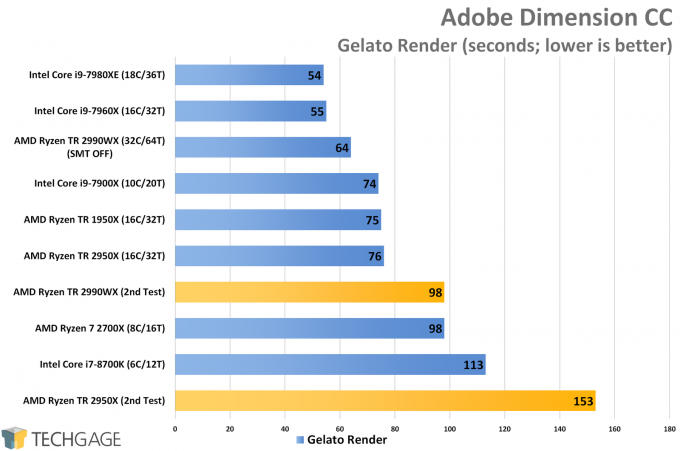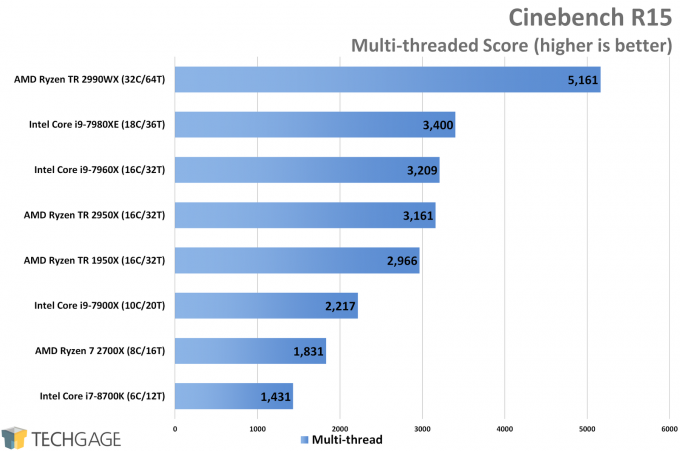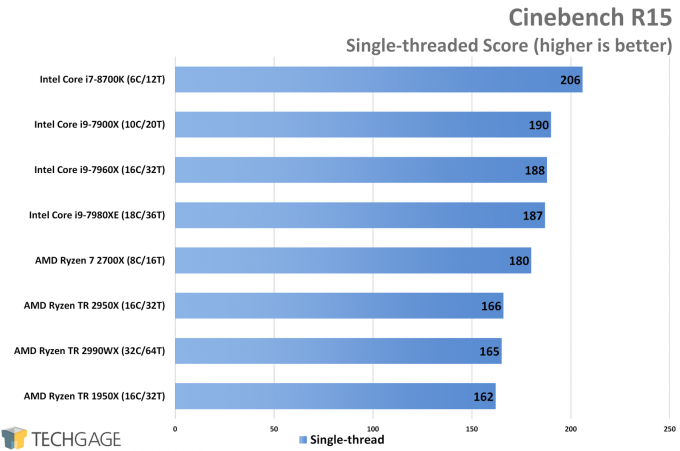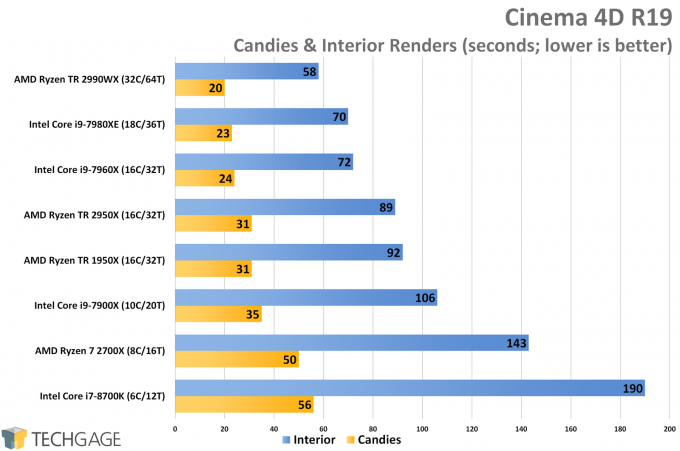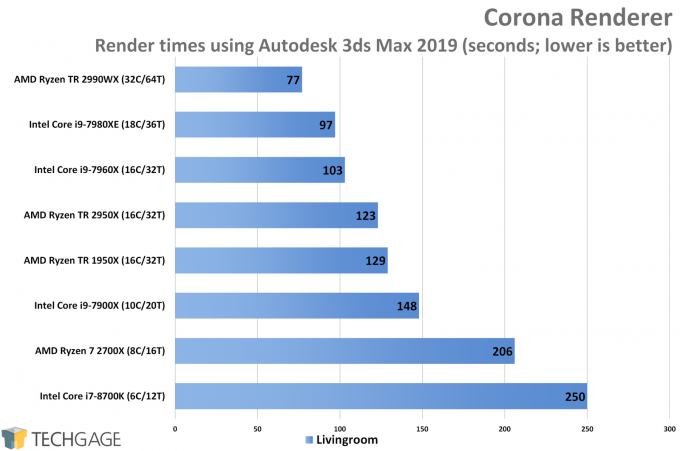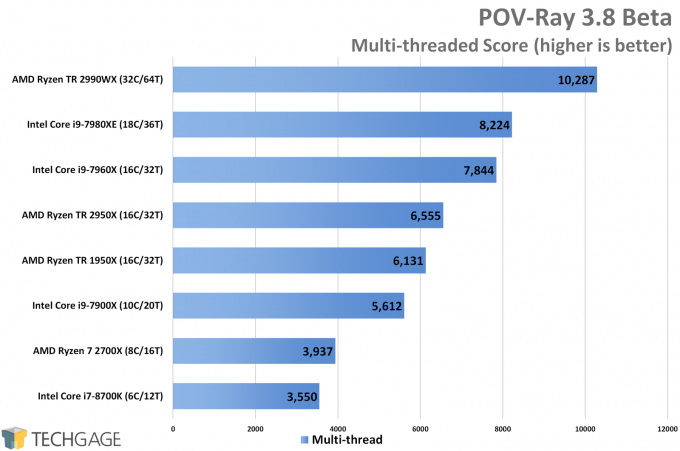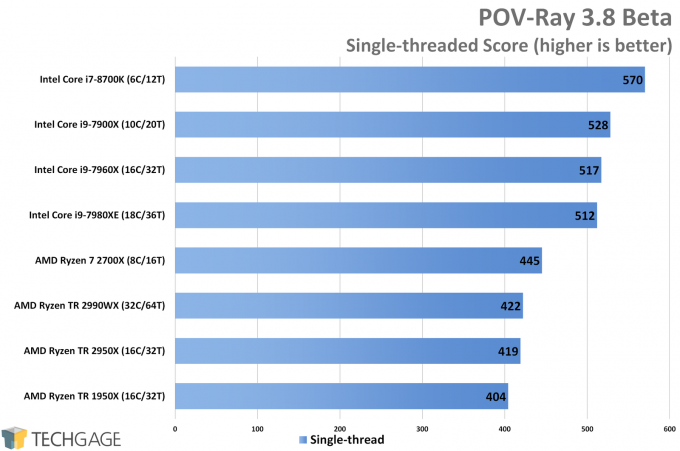- Qualcomm Launches Snapdragon 4 Gen 2 Mobile Platform
- AMD Launches Ryzen PRO 7000 Series Mobile & Desktop Platform
- Intel Launches Sleek Single-Slot Arc Pro A60 Workstation Graphics Card
- NVIDIA Announces Latest Ada Lovelace Additions: GeForce RTX 4060 Ti & RTX 4060
- Maxon Redshift With AMD Radeon GPU Rendering Support Now Available
Workstation Powerhouses: AMD Ryzen Threadripper 16-core 2950X & 32-core 2990WX Review

Just as we were starting to believe that 16-core CPUs were amazing, AMD has come along and dropped a 32-core bombshell. It’s called Ryzen Threadripper 2990WX, a workstation chip that cuts through renderers like butter. We’re putting it up against the forthcoming 2950X, and six other unsuspecting processors.
Page 5 – Rendering: Adobe Dimension, Cinebench, Cinema 4D, Corona, POV-Ray
I hope you’re not sick of rendering, because there’s a lot more of it on this page. On the previous page, many big-name renderers were tackled, but on this page, some others are as well, along with synthetic tests that will allow you to test your own PC and compare its results to ours.
Adobe Dimension
At AMD’s Ryzen Threadripper second-gen event, held in Modena, Italy a couple of weeks ago, the company had some demo PCs showing off what the new chip could do. I was intrigued by an application I had never seen before, one that turned out to be Adobe Dimension. Here I thought After Effects was the go-to for Adobe rendering. Nope, Dimension is another, and it’s an interesting one.
This is a renderer for those who essentially want to take a real-life photo and add rendered objects to it. This would mostly be used in marketing, but as an end-user just experimenting, it’s quite satisfying to use. Our render here involves a countertop in a beautiful kitchen that has only two rendered objects: a gelato container, and a glass cup to hold it in. Lots of rays, refractions, and all that good stuff.
As you can probably guess without much effort, this application hasn’t cooperated with me so much. The project I chose to test with, won’t open on the 2990WX when SMT is left enabled, hence the reason for it being disabled. That’s also the reason I included a second test (in orange), using a project provided by AMD. The fact that some projects have issue on this CPU isn’t a secret to the company (thankfully), and it’s actively working with Adobe to get it fixed. Further testing will take place in due time.
Cinema 4D & Cinebench
In my look at AMD’s and Intel’s 16-core processors a few weeks ago, I mentioned that testing Cinebench at this point in time seemed pointless, since it was four generations out-of-date. Coincidentally (or not, since SIGGRAPH is next week), MAXON announced C4D R20 last week, making Cinebench five generations out of date. I hope the company decides to turn R20 into a benchmark, but even if not, Cinema 4D becomes a stature in our testing going forward.
Let’s start with what’s familiar:
No surprises here. During the press event in Modena, AMD had overclockers on hand to push the 2990WX with liquid nitrogen, and before long, a world record was broken: 7600+. That’s an impressive number, but even at stock speeds, the 2990WX breaks the 5,000 mark, which is quite something considering the 7980XE sits at 3,400.
One great thing about Cinebench is that it also gauges single-threaded performance, and that gives us just about what we’d expect to see:
Intel’s super-fast i7-8700K sits comfortably at the top, with all of the CPUs below it largely being ranked by our expectations of each chip’s IPC. The 1950X is an odd result at the bottom, though, as I had definitely expected the 2990WX to be there. This is consistent with POV-Ray, coming up soon, but it comes down to the improved cache system in the second-gen Zen+ architecture. Clocks speeds also play a part as well.
In real-world tests, Cinema 4D emulates V-Ray to a certain extent in that real-world performance doesn’t align with the synthetic testing, but the gains are much more favorable to the 2990WX here than they were in V-Ray. Here, AMD clearly reigns supreme. If only Intel had that 28-core Core i9 shown-off at Computex here today; we’d see some interesting results. If AMD sent us Wraithripper for the 2990WX, it’d be appropriate for Intel to send us LN2 with that future chip.
Corona Renderer
Corona Renderer is not one I’m very familiar with, but given the strengthening that was being done to our test suite, I had to give it a shot. And… it’s impressive, generating gorgeous results very quickly. For my testing, I plugged it into 3ds Max, and the results are once again kind to AMD, putting the 2990WX at the top. If only the 8700K was an eight-core chip, then the 2700X would have better competition!
POV-Ray
POV-Ray is a classic renderer that’s become a de facto benchmark over the years, thanks to its amazing ability to scale. And by classic, I’m not kidding. I benchmarked version 3.7 eleven years ago with my Intel Core 2 Extreme QX6850 review. That’s still the current version, but as the graphs above suggest, 3.8 is in beta, and has been opted for here, as it does actually deliver higher results.
Ultimately, like Cinebench, POV-Ray paints a great picture of the 2990WX, although not to the same extent. The single-threaded performance on the 2990WX still proves to be better than the 2950X, which defies logic (due to the lower clock speed), but on a different day, the roles could have been reversed. They are extremely close as it is.
Support our efforts! With ad revenue at an all-time low for written websites, we're relying more than ever on reader support to help us continue putting so much effort into this type of content. You can support us by becoming a Patron, or by using our Amazon shopping affiliate links listed through our articles. Thanks for your support!




